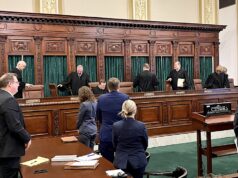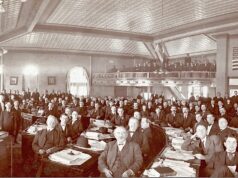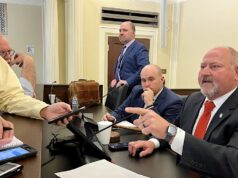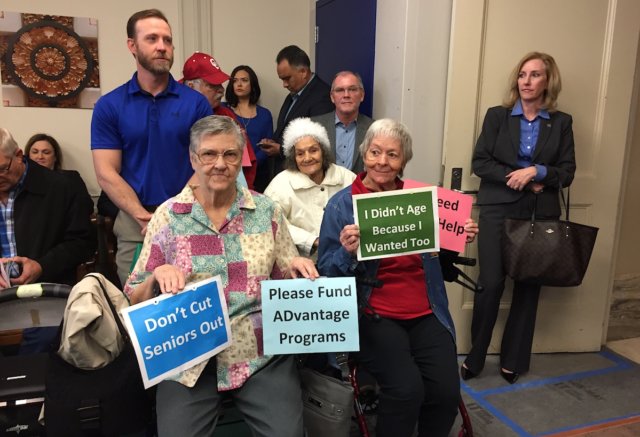
When the House Joint Committee on Appropriations and Budget took an unexpected four-hour recess during the middle of questions on an agency-cutting general appropriations bill, Jennifer Winter helped gather the dozen or so senior citizens she had brought to the Capitol today.
“We’re taking our seniors home,” said Winter, admissions and marketing director for the Village at Oakwood, a southwest OKC assisted living center. “They’re tired and need meds.”
Ruth Perry, 79, chimed in.
“I think they’re trying to get rid of us,” said Perry, who still had energy but had to sit a bit because she had not brought her pain medication. “We were here all day yesterday.”
Residents of the Village at Oakwood mostly said they are on the advantage waiver program, which is administered by the Oklahoma Department of Human Services and paid for with DHS appropriations through the Oklahoma Health Care Authority so as to draw federal matching funds.
The waiver allows payment toward the costs of health and living services for “the frail elderly and adults with physical disabilities age 21 and over who do not have intellectual disabilities or a cognitive impairment.”
Perry lives in southwest OKC now but was born in Lark, Oklahoma.
“I was born where Lake Texoma is today,” she said. “My daddy helped build it.”
‘What’s going on is really absurd’
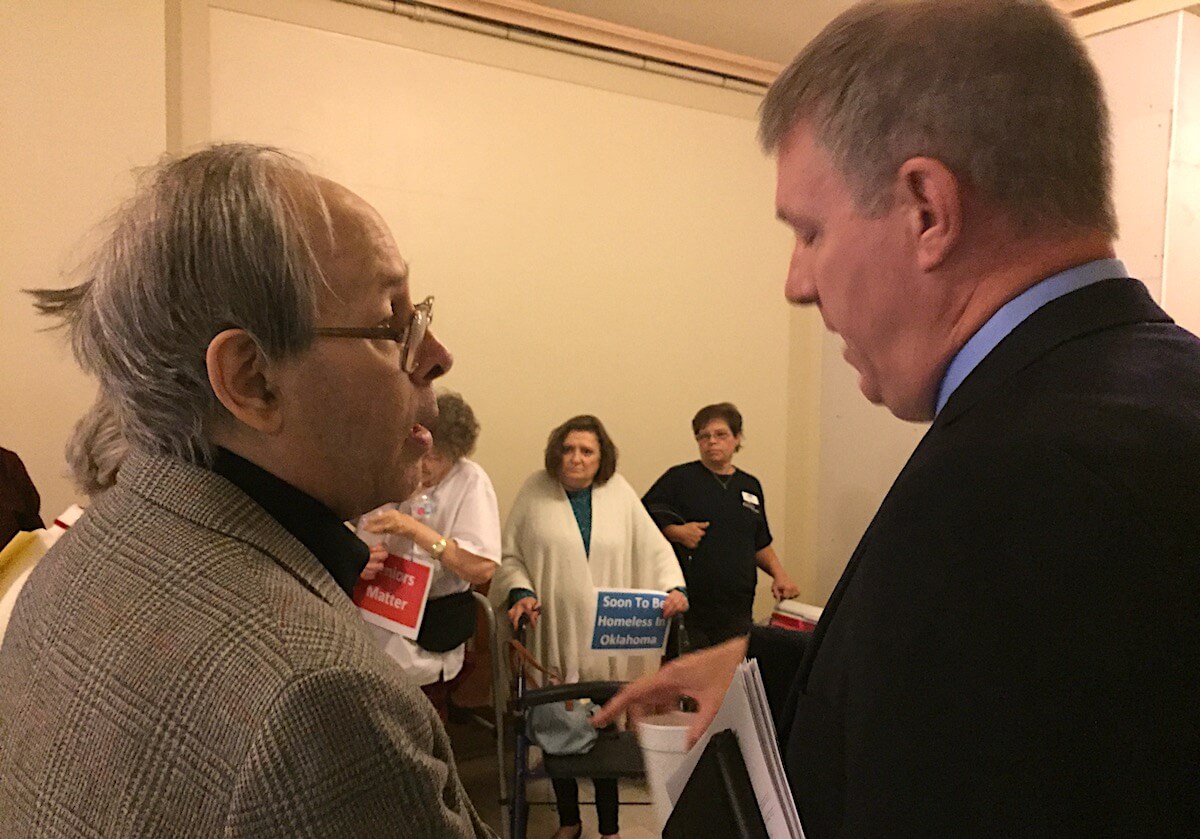
Tuesday morning, House members debated but defeated HB 1038, which would have directed the Oklahoma Medicaid agency to retain provider rates for nursing facilities like the Village at Oakwood no matter how much the Legislature cut agency funding.
“We have some people right outside the hall here saying, ‘Don’t make me homeless cause I’m old,'” Rep. Kevin Calvey (R-OKC) said in debate for the measure. “We need to not do that. A vote ‘No’ on this bill is a vote to allow people like those good people out there to be used as a bargaining chip to extort votes out of the Legislature.
“They put all those people in fear that they are going to be out on the street.”
Indeed, the state’s 2017 budget snafu has frightened seniors like 83-year-old Bob Hooker, who said he fears the advantage waiver program will be cut if lawmakers fail to appropriate money by Dec. 1.
“It would put a lot of us just out on the street because we’ve all gotten rid of our assets in order to qualify for living space in an assisted living home,” Hooker said. “The people from Section 8 have already told us we’re at the back of the list as far as trying to get new places to live. It would put us in a real bind. It would put our families — those of us who still have families — in a real bind.”
Around 9:30 Tuesday morning, Hooker stood with fellow Village at Oakwood residents Brooks Barr and Betty Carson waiting for an elevator.
“They think it’s about numbers, but it’s about people and the lives that would be absolutely devastated or would be severely crippled in quality of life,” said Barr, a retired professor who taught speech, humanities, theater history and play analysis.
Asked what playwright might have crafted the 2017 Oklahoma Legislature’s tragi-comedy, the 67-year-old Barr thought for a moment.
“Maybe Tom Stoppard,” Barr said. “He has a good feeling not only for dynamics but also for the absurd. In many ways, what’s going on is really absurd with all the games that are played and the dancing around what really needs to be done, and sometimes the twisting of priorities.”
‘I don’t have anything’

Sitting next to Barr and Hooker on her walker was 79-year-old Betty Carson. One day earlier, she had walked around the Capitol looking for House members who had voted against last week’s revenue package that would have avoided cuts this year and greatly reduced their likelihood and impact for next year.
“I just was a house wife,” Carson said when asked her background. “I sold my home to move in, and I don’t have anything. I’m a widow. For 20 years.”
Hooker, Barr and Carson all said they feel like pawns in a political game, and as their fellow residents watched Tuesday morning’s JCAB meeting, it likely was not clear who was moving them in which direction.
“It’s easy for us to be talked to by these people in kind ways that put us off, and in that respect we feel like we’re pawns,” said Hooker, a Republican whose brother once served the Legislature as a sergeant at arms. “We’re just being used, so to speak, for them to get on with other things. We’d like for them to take some action.”
Barr agreed.
“Sacrificed on the board of a chess game,” he said.
‘Mental turmoil’ for seniors

Winter expressed frustration with watching her residents’ dismay.
“It’s devastating for our residents,” Winter said. “I don’t like how the Legislature has accused the media of putting scare in our residents when actually the advantage waiver itself is the one that sent out the letters saying if they didn’t reach an agreement by Dec. 1 then our residents would be homeless.”
Asked whether she thought it was “fair” for state agencies to send out letters about potential service cuts while the Legislature is still negotiating potential solutions, Winter said she sees both sides.
“In one way, it is fair for legality reasons,” she said. “However, if there is a solution to the problem, I don’t feel it’s fair to take seniors who are dealing with comorbidities of anxiety, depression, other health issues that can raise stress — diabetics who get stressed out, their sugar levels can spike — I don’t think it’s fair our seniors should have to go through this kind of mental turmoil and wonder where they’re going to live in the future and how their needs will be met.”
The House JCAB meeting resumed shortly after 3 p.m., and HB 1019 (the general appropriations adjustment bill) passed 17-13.
(Update: This story was updated at 4:18 p.m. Tuesday, Nov. 14, to include the vote on HB 1019 and again at 6:55 p.m. Wednesday, Nov. 15, to clarify the role of both DHS and OHCA in administering the advantage waiver.)









